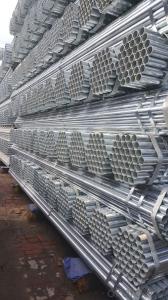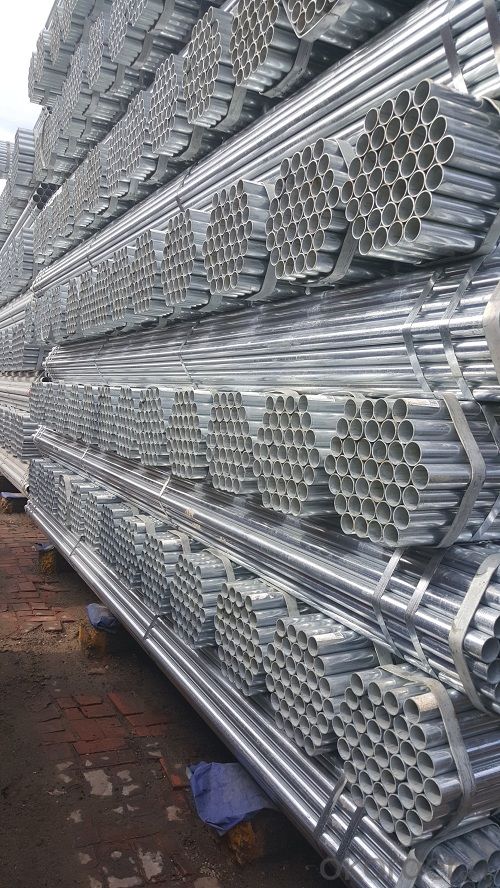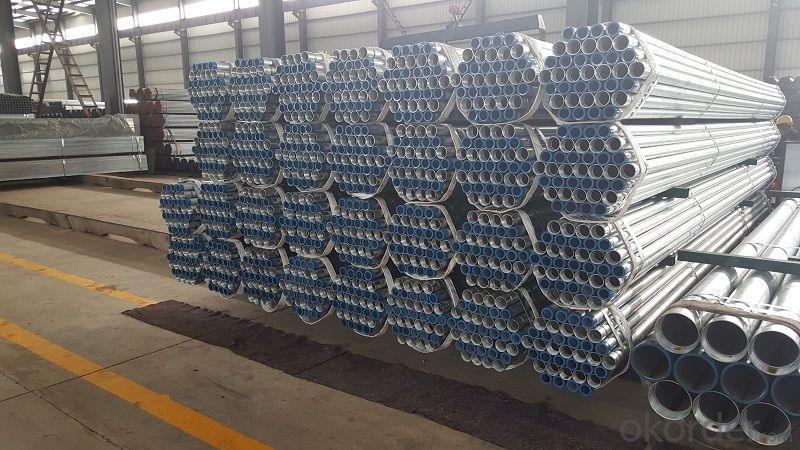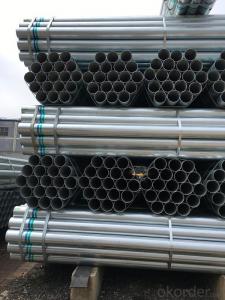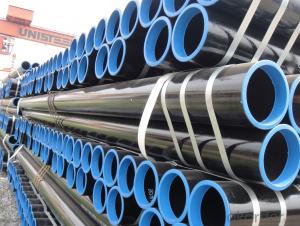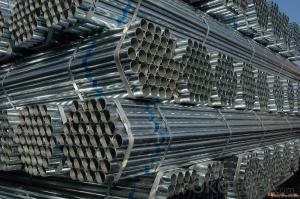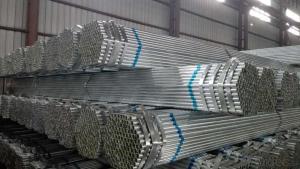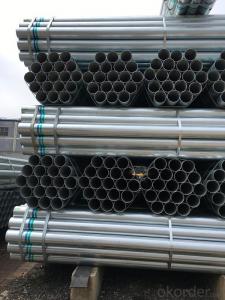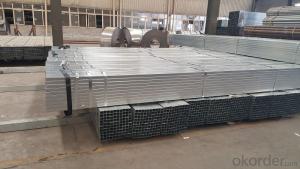Galvanized welded steel pipe for building materials
- Loading Port:
- Tianjin
- Payment Terms:
- TT OR LC
- Min Order Qty:
- 20 m.t.
- Supply Capability:
- 20000 m.t./month
OKorder Service Pledge
OKorder Financial Service
You Might Also Like
Specification
1、Structure of Galvanized welded steel pipe for building materials :
The surface of galvanized steel pipe welded steel pipe of hot dip galvanized layer or. Galvanized can increase the corrosion resistance of the steel tube, prolong service life. Galvanized pipe is widely used, in addition to water, gas, oil and other general low pressure fluid pipelines. It is also used in the petroleum industry, especially for offshore oil field of oil well pipe and oil pipe, chemical, coking equipment of oil heater, condensation cooler, coal run oil exchanger tube, and trestle pile, the mine tunnel support frame tube.
2、Main Features of Galvanized welded steel pipe for building materials :
• High manufacturing accuracy
• High strength
• Good visual effect
• Reasonable price
3、 Galvanized welded steel pipe for building materials Specification:
Standard | GB, DIN, ASTM ASTM A106-2006, ASTM A53-2007 |
Grade | 10#-45#, 16Mn 10#, 20#, 45#, 16Mn |
Thickness | 1 - 33 mm |
Section Shape | Round |
Outer Diameter | 21 - 610mm |
Place of Origin | Tianjin, China (Mainland) |
Secondary Or Not | Non-secondary |
Application | Hydraulic Pipe |
Technique | Cold Drawn |
Certification | API |
Surface Treatment | factory state or painted black |
Special Pipe | API Pipe |
Alloy Or Not | Non-alloy |
Length | 5-12M |
Outer Diameter | 21.3-610mm |
Grade | 20#, 45#, Q345, API J55, API K55, API L80, API N80, API P110, A53B |
Standard | ASME, ASTM |
1) Material:Q195 Q235 Q345 X42 X52
2) Specification range:OD:21.3-610mm,WT:6-70mm,length:6-12m or according to the requirement of clients.
3) Excutive standards:GB,ASME API5L.ASTM A 106/A53,Despite of the above standards,we can also supply seamless steel pipe with standard of DIN,JIS,and so on,and also develop new products according to the requirements of our clients!
4) Surface: galvanized.
5) Ends:Beveled or square cut,plastic capped,painted.
6) Packing:bundles wrapped with strong steel strip,seaworthy packing.
4、Packaging & Delivery
Packaging Details: | seaworthy package,bundles wrapped with strong steel strip |
Delivery Detail: | 15-30days after received 30%TT |
5、FAQ of Galvanized welded steel pipe for building materials :
①How is the quality of your products?
Our products are manufactured strictly according to national and internaional standard, and we take a test
on every pipe before delivered out. If you want see our quality certifications and all kinds of testing report, please just ask us for it.
Guaranteed: If products’ quality don’t accord to discription as we give or the promise before you place order, we promise 100% refund.
②How about price?
Yes, we are factory and be able to give you lowest price below market one, and we have a policy that “ for saving time and absolutely honest business attitude, we quote as lowest as possible for any customer, and discount can be given according to quantity”,if you like bargain and factory price is not low enough as you think, just don’t waste your time.Please trust the quotation we would give you, it is professional one.
6、 Galvanized welded steel pipe for building materials Images:
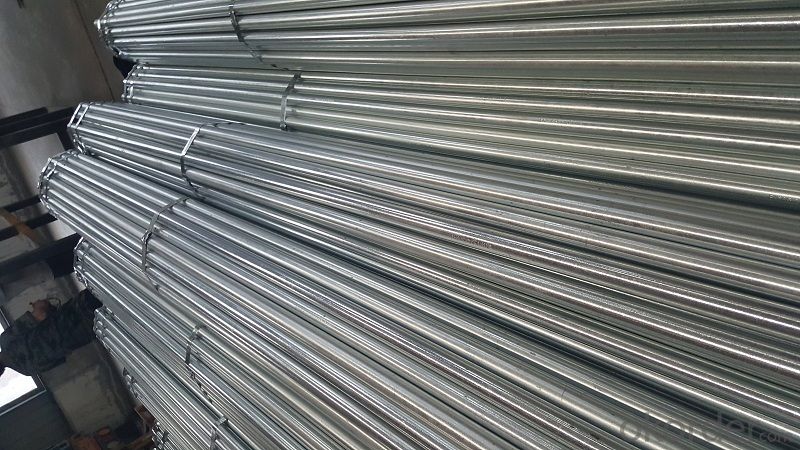
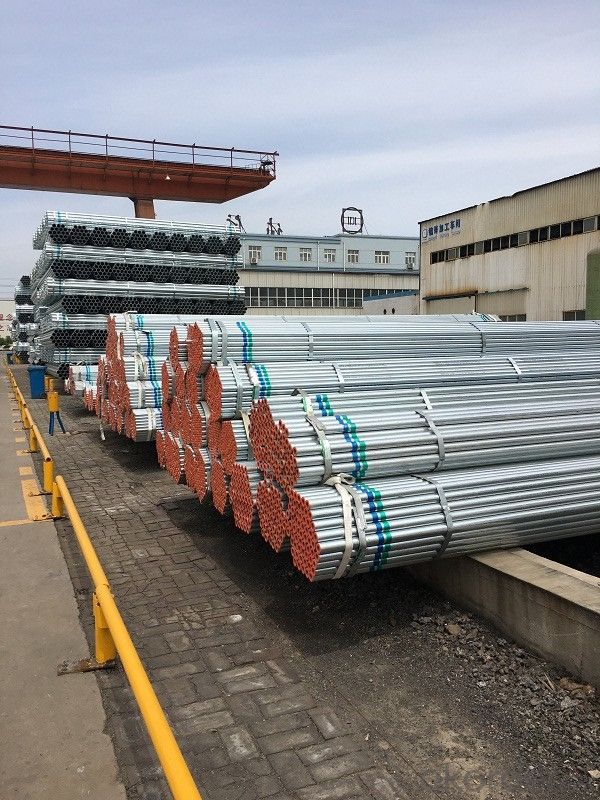
- Q: How are steel pipes threaded for connection?
- Steel pipes are threaded for connection using a threading machine that cuts grooves into the pipe's outer surface. The machine rotates the pipe while a die cuts the threads, creating a spiral pattern. This threading allows pipes to be securely connected by screwing them together, providing a tight and leak-free joint.
- Q: What is the difference between steel pipes and PVC-U pipes?
- Steel pipes and PVC-U pipes differ in terms of their composition, strength, and suitability for different applications. Steel pipes are made from iron and carbon, making them strong and durable, capable of withstanding high pressure and extreme temperatures. They are commonly used for transporting liquids and gases in industries like oil, gas, and construction. On the other hand, PVC-U pipes are made from polyvinyl chloride, a plastic material. They are lightweight, easy to install, and resistant to corrosion and chemicals. PVC-U pipes are typically used for water supply, drainage systems, and irrigation.
- Q: How do steel pipes withstand pressure?
- Steel pipes are able to withstand pressure due to their high strength and durability. The material properties of steel, including its tensile strength and resistance to deformation, allow it to withstand the internal forces caused by pressure without experiencing significant distortion or failure. Additionally, the seamless construction of steel pipes ensures that there are no weak points or joints that could compromise their ability to withstand pressure.
- Q: Can steel pipes be used for flagpoles?
- Yes, steel pipes can be used for flagpoles.
- Q: What is the shear strength of steel pipes?
- The shear strength of steel pipes can vary based on a variety of factors including the grade and thickness of the steel, as well as the manufacturing process and any additional treatments or coatings applied. Steel pipes generally possess a high shear strength due to the inherent strength of steel as a material. Determination of shear strength is typically achieved through testing and can range from 50,000 to 80,000 pounds per square inch (PSI) for common grades of steel pipes. However, it is important to acknowledge that the shear strength can be considerably higher for specialized or higher-grade steel pipes that are specifically designed for applications such as offshore drilling or high-pressure systems. Therefore, it is advisable to refer to the manufacturer's specifications or engineering standards for precise and specific shear strength values for a particular steel pipe.
- Q: What are the different strategies for pipe laying using steel pipes?
- Various strategies exist for laying steel pipes, each tailored to specific environments and needs. Here are a few commonly used approaches: 1. Open Trench: The traditional and widely employed method involves digging a trench along the desired pipeline route. Steel pipes are then placed in the trench, aligned, and welded together. This technique allows for easy access, maintenance, and repair of the pipeline. 2. Direct Pipe: This method is utilized when the pipeline needs to pass beneath obstacles like rivers or highways. It entails drilling a borehole from one side to the other while simultaneously laying the steel pipe. The pipe is subsequently pulled through the borehole, resulting in a continuous pipeline. 3. Horizontal Directional Drilling (HDD): HDD is employed when the pipeline must be installed beneath existing infrastructure or environmentally sensitive areas. A pilot hole is drilled horizontally, and the steel pipe is then pulled through using a reaming tool. This approach minimizes surface disruption and reduces environmental impact. 4. Sliplining: This technique involves inserting a smaller diameter steel pipe into an existing larger pipe. The smaller pipe is pushed or pulled into the larger one, providing a new corrosion-resistant lining. Sliplining is commonly used for rehabilitating deteriorated or damaged pipelines. 5. Microtunneling: Similar to HDD, microtunneling employs a microtunnel boring machine (MTBM) that simultaneously excavates the soil and installs the steel pipe. This method is frequently used for precise pipe laying, particularly in urban areas with limited space. 6. Jacking: Jacking, also referred to as pipe jacking or pipe ramming, is suitable for installing steel pipes in soil conditions that are unsuitable for open trenching. Hydraulic jacks or pneumatic rams are used to push the steel pipe into the ground. Jacking is commonly employed for crossing under railways, roads, or buildings. 7. Offshore Pipeline Laying: When it comes to subsea applications, various techniques can be employed, including S-lay, J-lay, or reel-lay. These methods involve deploying the pipeline from a vessel, either vertically or at an inclined angle, and welding the steel pipes together as they are lowered to the seabed. Each strategy possesses unique advantages and considerations, depending on factors such as terrain, environmental impact, existing infrastructure, and project requirements. It is crucial to thoroughly assess these factors and select the most appropriate pipe laying strategy to ensure the safe and efficient installation of steel pipes.
- Q: Can steel pipes be used for underground sewerage systems?
- Yes, steel pipes can be used for underground sewerage systems. Steel pipes are strong and durable, making them suitable for carrying sewage underground. They have a high resistance to corrosion and can withstand the pressure and load of the ground above. Steel pipes also have a long lifespan and are resistant to environmental factors such as moisture, chemicals, and temperature fluctuations. Additionally, steel pipes can be easily welded, making installation and repairs more convenient. However, it is important to ensure that the steel pipes are properly coated or lined to prevent corrosion and to comply with local regulations and standards for underground sewerage systems.
- Q: What is the impact of temperature on steel pipes?
- The impact of temperature on steel pipes can vary depending on the specific conditions and application. Generally, high temperatures can cause steel pipes to expand, potentially leading to buckling or distortion. On the other hand, extremely low temperatures can make steel pipes more brittle and prone to cracking. It is crucial to consider the temperature range within which the steel pipes will operate to ensure their structural integrity and prevent any potential failures.
- Q: What are the different types of steel pipe valves?
- There are several types of steel pipe valves, including gate valves, globe valves, ball valves, check valves, and butterfly valves. Each type of valve serves a specific purpose and has its own unique features and applications in various industries.
- Q: Are steel pipes resistant to UV degradation?
- Steel pipes are generally not resistant to UV degradation. Exposure to ultraviolet (UV) radiation over time can cause steel pipes to undergo various forms of degradation. UV radiation can cause the steel to become brittle, leading to cracking and potential failure. Additionally, UV radiation can also cause corrosion and discoloration on the surface of the steel pipes. To mitigate the effects of UV degradation, protective coatings or paint can be applied to the steel pipes to provide a barrier against UV radiation. Regular maintenance and inspections are also necessary to identify any signs of UV degradation and take appropriate measures to prevent further deterioration.
Send your message to us
Galvanized welded steel pipe for building materials
- Loading Port:
- Tianjin
- Payment Terms:
- TT OR LC
- Min Order Qty:
- 20 m.t.
- Supply Capability:
- 20000 m.t./month
OKorder Service Pledge
OKorder Financial Service
Similar products
Hot products
Hot Searches
Related keywords
